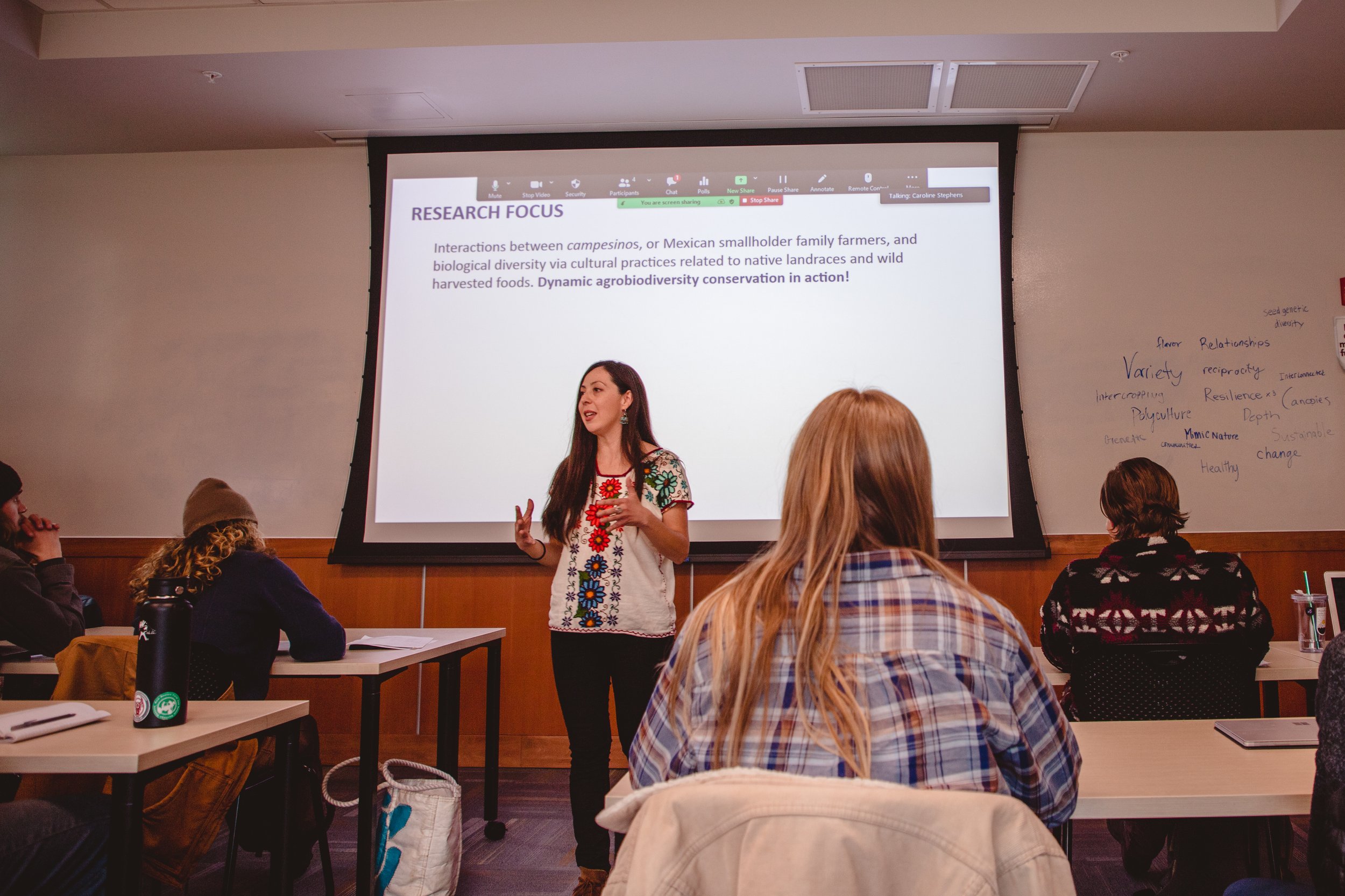“Knowledge emerges only through invention and re-invention, through the restless, impatient, continuing, hopeful inquiry human beings pursue in the world, with the world, and with each other.” -Paulo Freire
Teaching and mentoring are two of my driving forces. I was pulled into academia because I love teaching and because I am committed to increasing representation of BIPOC communities in this space.
I find in the challenge of teaching a constant source of inspiration and growth. Like other Chicana feminists, my teaching praxis is closely tied to my motherwork, they are nearly inseparable. As a working mother, I cannot do one in isolation of the other. I focus on nurturing and raising critical consciousness so that students can feel comfortable asking provocative questions, engage in challenging dialogue, and make steps towards carving their paths. I nurture students by providing them a safe place show up and be heard, and by providing the support that they need to learn and engage in meaningful ways. I raise critical consciousness by exposing students to new tools and perspectives, by sparking thought-provoking conversations, and by inviting them to question, and challenge, dominant paradigms. In teaching I learn—I learn about how we process information, I learn about how information and experiences can change our perspective, and I learn about how we can use knowledge as a liberating tool.
As a mentor, I aim to weave relationships based on mutual respect, kindness, and empowerment. As a first-generation student from an underrepresented community, I understand the challenges of navigating academic spaces. I have experienced feeling unable to identify with the educators in the front of the classroom, and by the same token, I have felt inspired and able to connect others who helped me explore and grow. These sets of experiences have been invaluable. My academic journey has been with the support and guidance of many. For me, mentoring means continuing to build by creating and extending opportunities for growth to others, especially to students of underrepresented communities.
I have had the privilege of learning and being mentored by some very genuine and unapologetic people committed to their craft, and I look forward to more opportunities to do the same.



Courses Taught
-
Theory and practice of Chicana/o/e and Latina/o/e politics through an analysis of the Mexican American Latinx/e diaspora experience, social agency, and response to larger political systems and behaviors using social science methods of inquiry. Unequal power relations, social justice, and the political economy. Students in this course conducted action-oriented community projects and policy analysis to deepen their understanding.
Upper level undergraduate course.
-
Experiences of migrants from Latin America to the United States in the 20th and 21st centuries. Focus on migrant engagements and contributions to US society, specifically political, economic, and social aspects of life at the local and global level. Students got involved in the community through action-oriented projects to deepen their understanding.
Upper level undergraduate course.
-
Introduction to foundational Chicana/o/x and Latina/o/x Studies perspectives, theories, and concepts. We explore the history and culture of Chicana/o/xs and Latina/o/xs to discuss contemporary Latina/o/x experiences in the United States. Theoretically, we approach this course from an intersectional lens taking into consideration race, class, gender, and sexuality. Our emphasis on history highlights how culture, politics, and identities change over time. We focus on the concept of cultural citizenship to explore Latina/o/x heterogeneity, social practices, community formation, and consciousness. We will unpack our social locations in relationship to privilege and power as well as Latina/o/x histories and identities.
Undergraduate course.
-
Exploration of early history of Mexican-origin peoples (Chicana/o/x) in what is now the United States and U.S.-Mexico border region. The history of this population allows us to understand the complexities of shifting and intersecting national, ethnic, racial, gender and class identities as conquest, capitalist development, and migration brought, often violently, a diversity of peoples into contact with one another. Through the lens of the Mexican American experience, the course seeks to provide insight on how our multiethnic, globalized society emerged out of a context of power, race/class/gender hierarchies, labor segmentation and apartheid to reveal the roots of its possibilities and challenges.
Undergraduate course.
-
Food is central to our lives – a basic human need imbued with political, economic, ecological, and cultural meaning. Whether we think about it or not, one of the most fundamental ways that we interact with the natural and social world every day is through the food we eat. Accordingly, in this course, we will look at the historical and ecological conditions created by the dominant, industrial food and agricultural system. We will also investigate emerging alternatives and grassroots efforts to move toward a more just, healthier, and ecologically sound food system.
Undergraduate/graduate course.
-
Critical environmental sociological lens to examine the historical roots, challenges and offered solutions to a variety of environmental issues. We will explore how particular histories, framings and assumptions about society, environment and development have led to different assumptions of what is a “problem” and a “solution,” and how the latter itself creates its own set of conflicts (including what constitutes “conservation” according to whom!). We will pay close attention to the politics of environment, development and conservation, and to theories that have arisen to better illuminate these forces such as environmental justice and conservation approaches, including fortress, participatory, community-based and market-based ones. Each entails a trajectory of how environmental “goods” and “bads” are distributed, and who makes the decisions about rules and institutions for governing access to and control over them, including deleterious impacts on particular classes, races, genders, regions, and livelihoods. We will investigate the opportunities and challenges offered by recent approaches such as sustainability, resilience, food democracy/sovereignty and environmental justice towards re-envisioning and re-creating society, environment and development as more mutually beneficial for ecology and society.
Undergraduate course.
-
Introduction to the diversity of historical, cultural, environmental, and political landscapes of Latin America.
Undergraduate course.